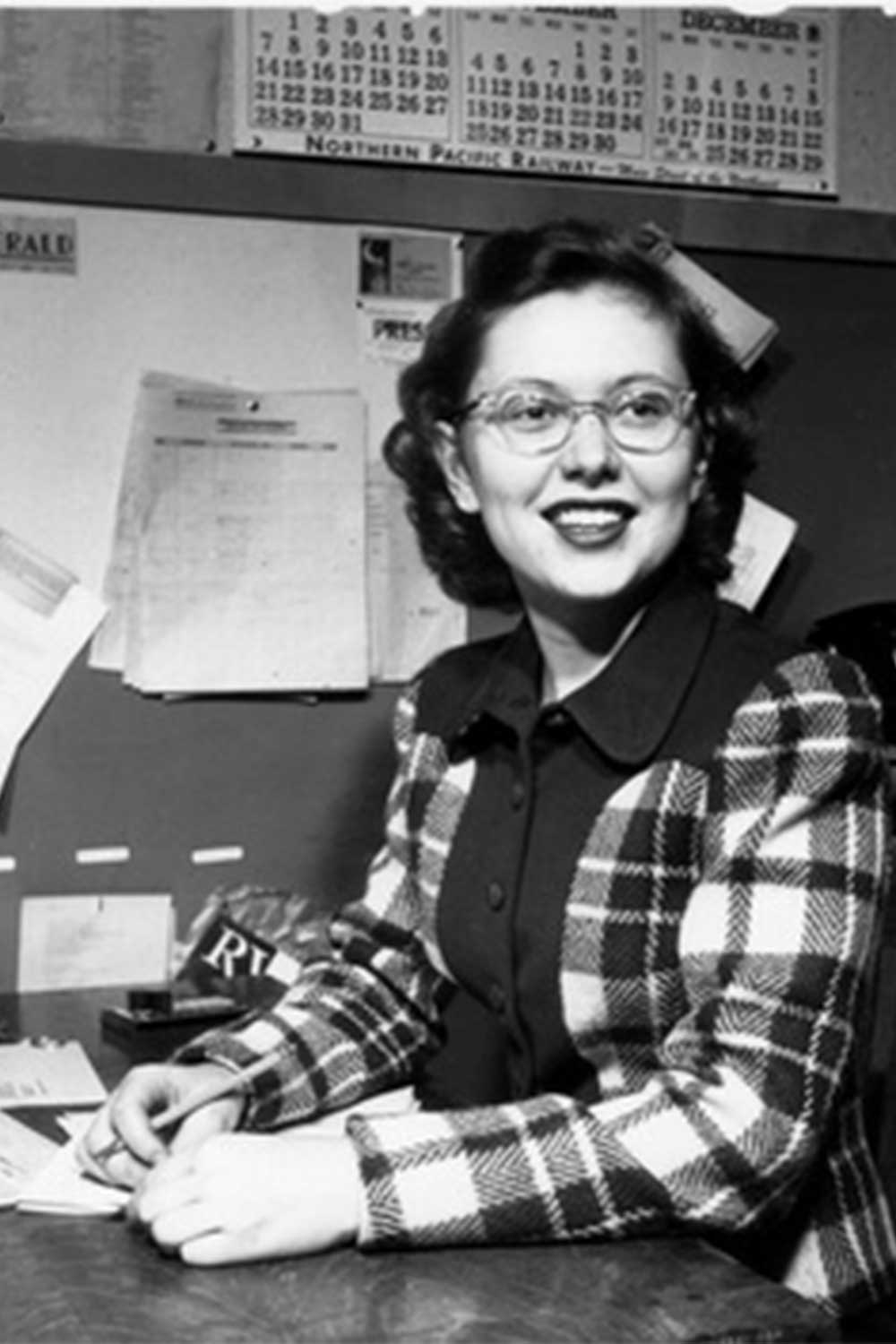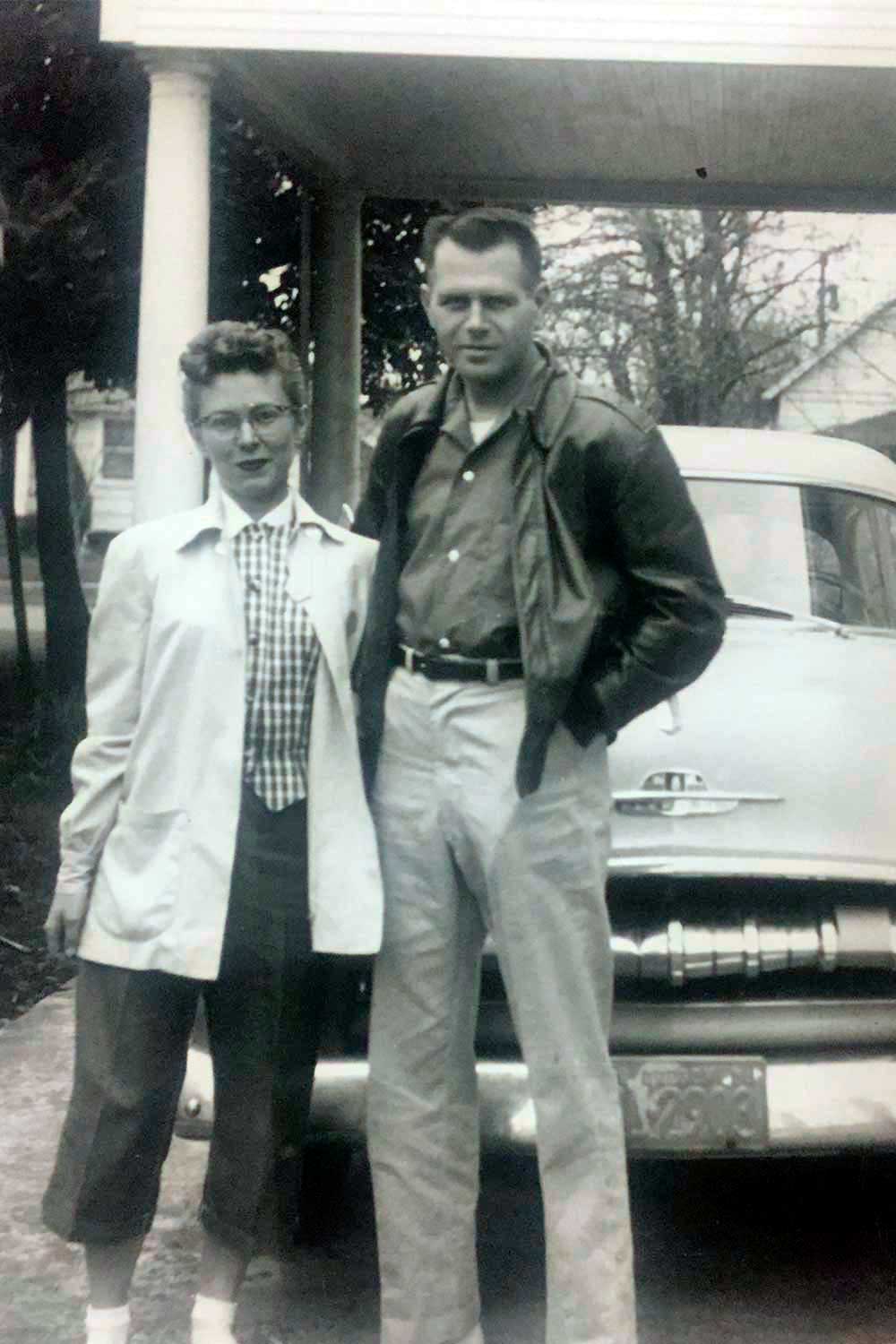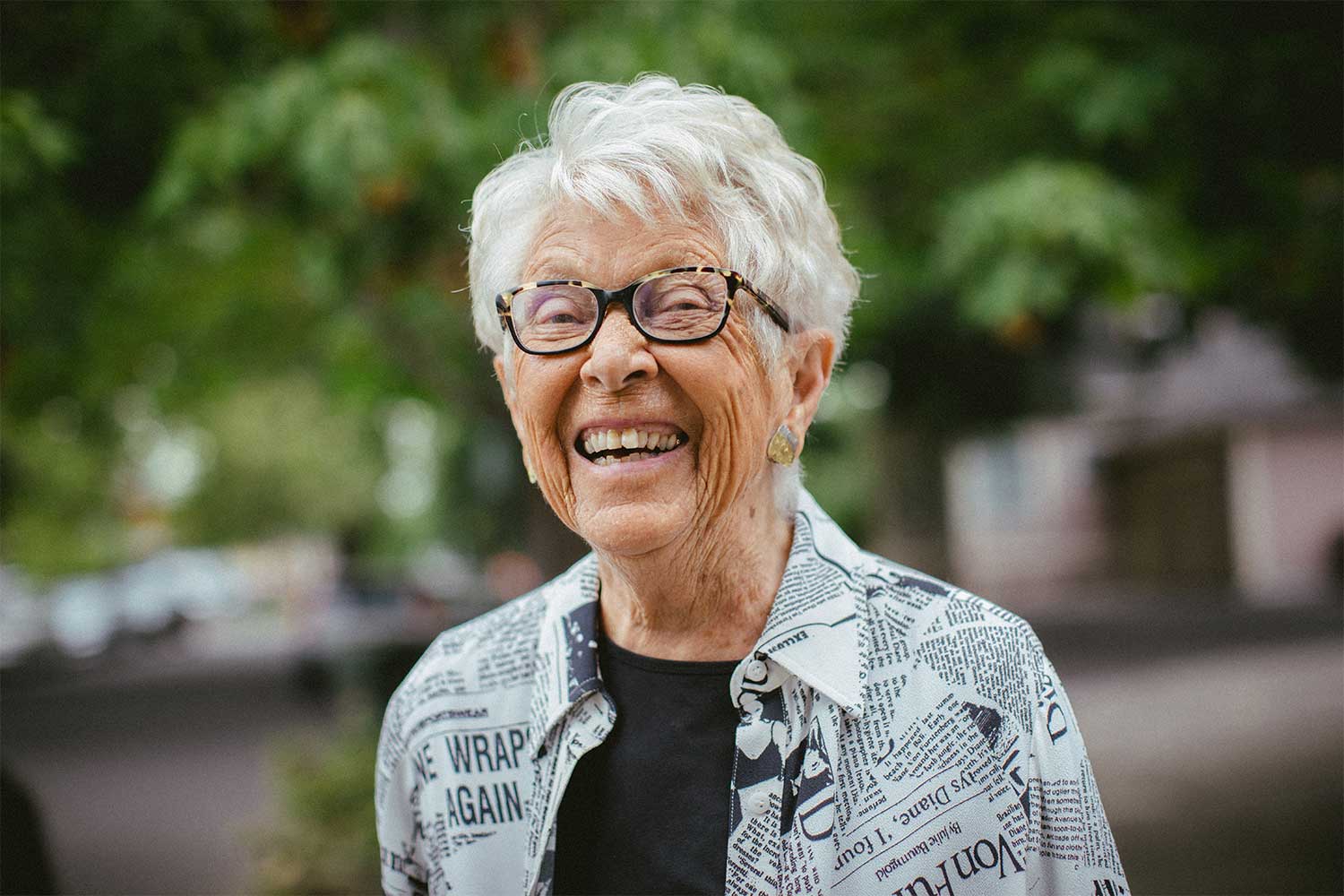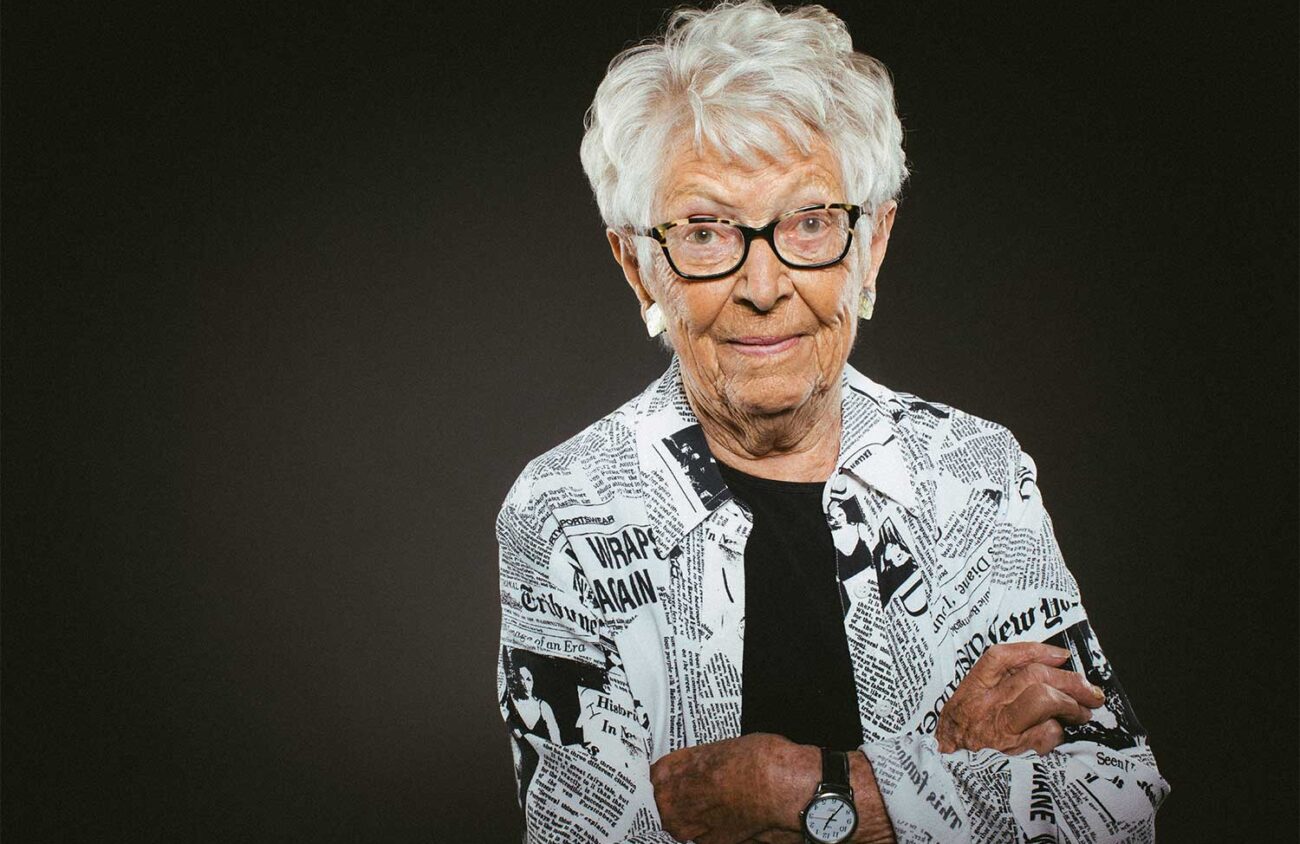Anita Johnson, the majority owner of Eugene Weekly and the driving force behind this newspaper’s dedication to public service and community journalism, died of cancer on Dec. 15 at her home in Eugene. She was 95.
For more than six decades, Anita and her husband, Eugene lawyer Art Johnson, served their community as advocates for schools, the arts, progressive politics, environmental causes and justice for the oppressed.
Yet none of Anita Johnson’s civic work had more immediate and lasting impact than her ownership of Eugene Weekly.
Under Anita’s leadership, the Weekly emerged in 1993 as an alternative news source, digging deeply to reveal stories other local media overlooked.
The Weekly’s masthead listed Anita as “contributing editor,” but she operated as the newspaper’s publisher, a title she refused to carry. Well beyond her 95th birthday, Anita still drove herself to the paper to attend news meetings, write short opinion pieces, take part in political endorsement interviews, and urge the staff to focus on the newspaper’s central mission.
“How does this little newspaper,” she would ask, “make the world a better place?”
EW took on complex and controversial issues facing the community: saving the famed Kesey Square in downtown Eugene, questioning taxpayer subsidies for corporations, protecting rivers, old-growth forests and wetlands, and tracking toxic chemicals.
Anita insisted EW fearlessly scrutinize powerful institutions, including local power brokers, elected officials, and the University of Oregon. To her, nothing was sacred except the pursuit of truth. In one of her last messages to the newspaper, Anita applauded the Weekly’s investigative reporting of UO officials’ efforts to cover up a string of fraternity party druggings earlier in 2024.
In recent years, the newspaper has investigated local officials’ treatment of the unhoused and mentally ill. At Anita’s insistence, EW in 2021 began publishing obituaries for people who died homeless — more than 20 so far.
No matter how much investigative and watchdog reporting the Weekly produced, Anita never thought it was enough. She believed journalists too often asked easy questions of people in power and authority.
“Ask the second question,” she said, “which is probably the question your subject does not want to answer, so go after it.”
After The Register-Guard’s local owners sold the daily newspaper to GateHouse Media in 2018, Anita underscored EW’s commitment to publishing political endorsements and letters to the editor. At the suggestion of her son Derek, she dubbed the newspaper’s opinion section “Local and Vocal” — a slogan Anita felt summed up the paper’s commitment to community voices and its own stalwart stands on local issues.
In 2021, The Coeur d’Alene Press, where Anita started as a reporter in 1946, summed up her role: “Writer. Publisher. Warrior for the Free Press.” That same year, the Editor & Publisher trade publication named Anita one of the nation’s 15 most influential journalists over 50 years old, honoring her as a journalism leader “still firmly committed to journalistic and publishing excellence.”
“A democracy cannot survive without a free press,” Anita told E&P. “I love print media, so I desperately want it to continue. Electronic media technology may squeeze print, but we know investigative reporting is critical, as is the publication of the news in some form. Unfortunately, the form is difficult to predict during this turbulent time.”
Eugene Weekly continues to print 27,000-plus issues every week along with its online publication.
As demanding as she was about the newspaper’s mission, she put people first. “There is an elegance to Anita’s personality that is commanding,” Bob Keefer, a veteran journalist and former EW arts editor, told an interviewer last year. “She creates an atmosphere at the Weekly where people want to do good work. She’s welcoming and encouraging and forgiving to a degree that I’ve never seen from a newspaper publisher.”
EW has won scores of national and regional awards for its investigative reporting and its coverage of the environment, transportation, local politics, arts, music and culture, and sports.
Many awards went to student journalists who often got their first publishing experience at the Weekly. In all, EW has published the work of 150-plus journalism students from UO and Lane Community College — more than any other professional news outlet in Oregon. The opportunities Anita provided were a launching pad for journalism students who landed at The Oregonian, The Wall Street Journal, Oregon Public Broadcasting, Bloomberg, CNN, The Seattle Times, High Country News and USA Today.
Anita’s commitment to community news and Eugene Weekly’s central role in civic life often came at a price.
In better financial times, Anita and her co-owners reinvested EW’s profits into the newspaper. In more difficult times, Anita opened her checkbook to keep the newspaper vital. She declined offers to sell the Weekly after COVID-19 hit newspapers hard and her husband, Art, died in 2022.
But the end for Eugene Weekly nearly arrived one year ago, when the newspaper disclosed on Dec. 28 it had been the victim of embezzlement carried out by one of its employees, who had also concealed the newspaper’s growing debts. After discovering the theft, the Weekly laid off its staff and halted print publication. An unpaid crew kept the news flowing on the website.
Anita faced shuttering the newspaper but then decided that the community for which the Weekly had battled on behalf of for so many years would step up to save it.
She was right. EW’s announcement and request for community help earned international headlines and unleashed a torrent of community support. Thousands of individual donations — and heartfelt notes about how much the paper meant to readers — poured in, enabling staff to return to work, revive print publication and keep the newspaper running.
That bodes well for the paper’s future, says son Derek Johnson. “We see how much readers love and value the paper, and we think the best way to preserve this community treasure is to begin the process of transferring it into community ownership,” he says. That starts with honoring his mother’s wishes and handing the paper to Editor Camilla Mortensen, he says.
Anita is survived by daughters Corrie J. Yackulic (Ted Yackulic) in Seattle and Andrea Johnson (Charles Ziccardi) in Philadelphia; sons Derek (Lynette Williams) and Bern (Hillary Johnson), both of Eugene; and eight grandchildren: Larken and Quinn Yackulic, Luciana and Aidan Johnson, Harper and Tatum Johnson, and Charlotte and Marco Ziccardi.
•••
Anita Mae Holmes was born May 8, 1929, in Navajo, Montana, about 15 miles south of the Canadian border. Her mother, Alma, was the daughter of Danish immigrants, and her father, George, managed a grain elevator. Anita, her parents, and her older sister, Grace, lived in a two-room house that rented for $15 a month. A rope led from the front door to the outhouse so the girls would not get lost during blizzards.
Soon after Anita turned six, a fire destroyed the grain silo, leaving George without work. Her family set off by bus without a destination. When they reached Coeur d’Alene, Idaho, her father looked around and declared they had found their new home.
Anita thrived in school. Teachers singled her out for the strength of her writing and her relentless inquisitiveness. Anita recalled how her third-grade teacher helped define her outlook on life. “There are three kinds of people in the world,” Anita recalled the teacher telling the class. “One doesn’t even know how the world turns. Two, they know the world turns, but don’t want to do anything about it. Three, they know the world turns and think, ‘I want to do what little bit I can to make it better.’”
She won election as her high school’s first female student body president. In time, it seemed as if she ran or directed every service club, including 4-H and Job’s Daughters at the local Masonic temple. She won academic awards and helped launch a student radio show. As an editor of the high school paper, Anita routinely visited the newsroom of the local daily, the Coeur d’Alene Press, which soon offered her work as a reporter.
One of the editors, Louise Shadduck, took Anita on assignment to report on a fiery plane crash. One of the victims was still in the wreckage when Anita arrived. The experience shook her, but Shadduck helped her see the importance of informing the community, whether the news was upbeat or tragic.
“Journalism was made for Anita, and Anita was made for journalism,” Bern Johnson says. “She’s curious and always questioning and probing. She likes to find the story behind the story. And Coeur d’Alene opened the door for her to journalism.”
On Shadduck’s recommendation, Anita enrolled at the University of Oregon to study journalism. She was named the top female student in her freshman and sophomore years, and her reporting for the Oregon Daily Emerald won awards. She had become such a well-known presence at the UO that the Emerald referred to her as “BWOC Holmes” — “big woman on campus.” In her junior year, she landed a Washington, D.C. internship with Sen. Henry Dworshak, a Republican from Idaho. Before she returned from Washington, she’d been named the Emerald’s editor-in-chief.
In the newspaper’s first issue under her leadership, Anita gave readers a sense of what to expect.

“The Emerald’s editorial page,” she wrote, “doesn’t merit its ink if it doesn’t stand for or against something.” And the editorials themselves, she promised, “will be as subtle as a punch in the nose.”
She delivered on that pledge. In 1951, Anita broke a national story that exposed racism and injustice on the UO campus. A group of men burned a cross on the lawn of the Gamma Phi Beta sorority because a young sorority woman, Deb Mohr, was dating a Black man, DeNorval Unthank Jr.
The incident went unreported by the news media. None of the mob’s members faced any punishment. Rather than protect Mohr, Gamma Phi Beta leaders told her she had to stop dating Unthank or leave the sorority house. Mohr moved into a university dormitory, where the house mother banned Unthank from entering the building — a restriction no white student faced.
UO officials kept silent until Anita exposed the incident in an editorial that opened, “An Oregon sorority has just paid homage to one of the strongest satans of our society.… prejudice.”
Anita protected the identities of the two students as she reported on the incident and denounced the official silence.
“Restaurants which will not serve colored people because the owners fear something they call society’s code,” Anita wrote. “(H)otels which will house only whites, no matter what quality the whites… colleges which will not admit colored students — they are only a few of the groups which have acted exactly like Oregon’s sorority.”
“Where is the courage,” Anita added, “so many of us lack when it comes time to stand up against something we know is wrong?”
Her editorial, “The Code of Prejudice at Oregon,” made national news. Anita faced backlash from university administrators for embarrassing the UO, but she didn’t back down. (Unthank and Mohr later married. Unthank, who became the first Black graduate of the UO’s architecture program, died in 2000. In 2021, UO named a dormitory in his honor.)
Anita landed a reporting job at The Washington Post right out of college. The Post assigned her to the newspaper’s “women’s desk,” a common assignment for female reporters. This assignment was ironic for Anita, who, as Emerald editor, had killed the student paper’s women’s page.
At the Post, she typed up listings of announcements of engagements, weddings and debutante balls. Her stories included profiles of the best-dressed women in Washington and a feature about the Six-Six Club, a dating society for tall men and women who, as Anita wrote, “tip the tape measure where basketball players belong.”
She longed to cover politics, a rare assignment for female reporters at any level of experience. To hear Anita tell it, Post editors told her that if she stuck with the Post, she’d eventually cover Capitol Hill or land foreign assignments.

But Anita walked away from the Post in the spring of 1953 when her boyfriend from the UO proposed marriage. Art Johnson came from a family of lawyers in Eugene. At the UO, Art was a significant player in campus politics. An independent elected as student body president, he worked to upend the Greek system’s grip and to give other independent students more influence. He had graduated UO before Anita and just earned his degree from Harvard Law School when Anita accepted his proposal.
Once married, the Johnsons moved to Stead Air Force Base in Nevada, where Art fulfilled his ROTC commitment by serving in the JAG corps and training troops in survival skills. Anita took a civilian job in an Air Force intelligence office. After Art’s two years of service, they traveled through Europe for four months, camping out of a Volkswagen and hiking in the Alps.
They returned to Eugene, and Art joined his father’s law firm, eventually breaking out on his own as a successful trial lawyer. As Anita later wrote, she and Art “had four children in five years, so [my] journalistic career temporarily ended and a second career began.”
As she had in high school and college, Anita threw herself into a wide range of services — PTA, the school district budget committee and the Friends of Eugene Public Library board. She pushed her children to excel in school, especially in improving their writing. She also helped publish The Grasshopper, a children’s neighborhood newspaper. (The Johnson kids convinced UO track star Steve Prefontaine to sit for an interview.)
Art’s legal success provided the Johnsons a financial comfort Anita had never known. But their sons and daughters recall their parents wanted to have nothing to do with country clubs or to splurge on expensive vacations. They loved to ski and often stayed in rustic cabins and ate stew Anita had cooked ahead of time.
During election season, the Johnson house became a center for Democratic candidates. Staffers for two Kennedy presidential campaigns — Robert Kennedy in 1968 and Ted Kennedy in 1980 — used the home as a base. The Johnson kids often were sent to canvass door-to-door for Democrats. “Anita was always engaged and always a hands-on mom,” Derek Johnson says. “I always had the impression that she could do whatever she set her mind to do. Looking back, that was true.”
Daughter Corrie Yackulic says both her parents demonstrated through their civic lives the importance of serving their community. “I do remember them both feeling that it was part of their obligation,” she says, “that we all owe it to our communities to be engaged and to contribute and to try to make other people’s lives better. It sounds, like, really trite, but they believed that genuinely, and they really did follow through on it.”
Anita later took a series of jobs with the UO, including writing speeches for UO President Arthur Flemming, and articles for the UO alumni magazine and faculty publications. UO President Paul Olum named her acting director of the university’s affirmative action programs.
But Anita wanted something more. Art had built an impressive career, and she had been there to support him. But she spoke about the journalism career she had left behind — not with regret or anger, but wistful about what might have been.
Running an alt-weekly became Anita Johnson’s chance to regain what she could of her journalism dreams.
“Eugene Weekly was her third act,” Andrea Johnson says, “as if everything had been building toward that.”
•••
Eugene had seen alternative newspapers come and go, most recently the Willamette Valley Observer, which launched in 1975. Many local leaders dismissed the Observer as a left-wing activist paper, but its reporting provided accountability otherwise missing in town.
The Observer shut down in 1982. That same year, Elisabeth Lyman, Lucia McKelvey, Sonja (Ungemach) Snyder, Bill Snyder and Lois Wadsworth launched What’s Happening, a free weekly guide and calendar, in part to fill a void left by the Observer. Nearly a decade later, the paper’s owners went looking for financial help.
Anita saw an opportunity. She approached an old friend from the UO, Fred Taylor, who had retired to Oregon after more than three decades at The Wall Street Journal, including as managing editor and executive editor.
Anita asked Taylor and his wife, Georga, to invest with her in What’s Happening. Taylor agreed but only if the publication transformed into a “real newspaper.” Anita told him that’s exactly what she wanted.
In 1991, the Johnsons and Taylors bought a stake and rechristened the newspaper Eugene Weekly. The newspaper kept its focus on the local arts and culture scene, but added a watchdog sense as its reporters scrutinized City Hall, the Lane County Commission and local school districts. The newspaper investigated and editorialized about the taxpayer-subsidized Hyundai computer chip plant and the proposed West Eugene Parkway. The bypass was never built. The Hyundai plant building stands empty.
Other news media hesitated to investigate the community’s powerful interests. “Mom just thought about the role of a newspaper totally differently,” Andrea Johnson says. “That is, of course, what you do…. It was important to her to have that voice. She just thought that Eugene Weekly had an opportunity, but also an obligation, to do that.”
The newspaper investigated rape allegations against two Eugene police officers, Roger Magaña and Juan Lara, who later went to prison and cost taxpayers more than $1 million in settlements to their victims. Recently, the newspaper investigated the criminalization of homelessness and the city’s treatment of unhoused campers. (The city now faces a civil suit based on the newspaper’s reporting.) Eugene Weekly also exposed the 2020 death of a Eugene man who died after officers pinned him to the ground. (The newspaper’s reporting led to a civil rights lawsuit.)
Anita celebrated the reporting awards these and other stories won for EW. She didn’t seek accolades for herself. But accolades found her.

In 2017, the City Club of Eugene honored Anita with its “Turtle Award,” given to those who “stick their neck out,” for her leadership in a range of civic issues.
In accepting the award, Anita wished the paper could do more investigative reporting. When she was 84, she told her son Derek that she wished she could print the paper more often. “If I were only 60 again,” she said, “we’d go daily.”.
In 2023, the University of Oregon School of Journalism and Communication, where she earned her degree 71 years earlier, inducted her into its Hall of Achievement. Reluctant to accept praise, Anita nonetheless hung the award in her home so guests walking in through the front door could not miss it.
•••
“Eugene Weekly and Anita were a perfect match,” Bern Johnson says. “She wanted to do journalism, and the newspaper needed passion and expertise, and they came together. She never tried to make money off the Weekly. As it turns out, she’s lost a lot of money on the Weekly, but it was a great thing for her to do for the community.”
But a series of events placed the Weekly’s future in doubt.
The COVID-19 pandemic struck a blow to the already struggling news media business — alt-weeklies traditionally rely on advertising from restaurants, bars and entertainment venues, all locked down by the pandemic. EW once produced a paper with 80 pages or more. During the pandemic, page counts dropped to 16.
Art Johnson died in 2022 at age 94. Anita, then 92, wrote his obituary for EW. She was the lone majority stockholder without a succession plan for the newspaper. But she resisted talking about what would come next. She knew that her sons and daughters had no interest in taking over. She often quoted Fred Taylor, who implored her shortly before his death in 2015 to hold on as long as possible.
“Don’t sell the Weekly,” Taylor told her. “The community needs it.”
The news in December 2023 that Eugene Weekly had been embezzled left Anita overwhelmed by anger and grief. But she refused to let the paper go without a fight. The announcement of the embezzlement triggered an outpouring of support.
“That left her inspired,” Bern Johnson says. “That left her knowing this community valued what she did and what the newspaper stood for.”
The family is planning a memorial for May 2025.
Contributions in memory of Anita Johnson’s life and work can be made to SquareOne Villages, which seeks to bridge the gap between the street and conventional housing with a variety of stable, dignified and cost-effective shelter and housing options. SquareOnevillages.org/contribute.
And you can support her legacy at Eugene Weekly via the paper’s nonprofit arm, Eugene Weekly Press Club, at bit.ly/AnitaTributeEW.
— 30 —
